2018 AIFA grant announcement coming soon
28 August 2018:
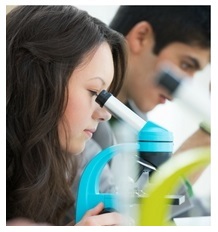 This year’s AIFA grant recipient will be announced at the Australasian Society of Clinical Immunology and Allergy (ASCIA) Annual Conference on Friday 7 September 2018.
This year’s AIFA grant recipient will be announced at the Australasian Society of Clinical Immunology and Allergy (ASCIA) Annual Conference on Friday 7 September 2018.
This year AIFA grants have drawn interest and collaborations from researchers all over Australia. A record 21 EOIs were received. These EOIs covered topics as varied as diagnosing allergy, predicting allergic diseases, Graves’ disease, common variable immune deficiency, signalling in primary immunodeficiencies, urticaria, insect allergy, drug allergy and allergic asthma.
After much hard work by our Grant Selection Panel, 5 projects were shortlisted and finally 1 selected. We look forward to publicly announcing the successful recipient next week.
Past successful projects include the AusPollen project, Mevalonate kinase deficiency (MKD) and Jack Jumper Ant Allergy. Further details on these and other past projects can be found at www.allergyimmunology.org.au/projects
All of the projects have the potential to make a difference to the diagnosis, management and treatment of allergy and other immune disease. Help us to fund more projects by donating at www.allergyimmunology.org.au/donate


 It’s not always a joke. Exercise-induced anaphylaxis is a rare but real disorder. It causes people to have an allergic response to exercise. Yes, exercise can really trigger asthma, hay fever (rhinitis), hives (urticaria) and even anaphylaxis. Some people have symptoms with exercise alone while for others it is set off by a food eaten in the hours prior to exercise.
It’s not always a joke. Exercise-induced anaphylaxis is a rare but real disorder. It causes people to have an allergic response to exercise. Yes, exercise can really trigger asthma, hay fever (rhinitis), hives (urticaria) and even anaphylaxis. Some people have symptoms with exercise alone while for others it is set off by a food eaten in the hours prior to exercise.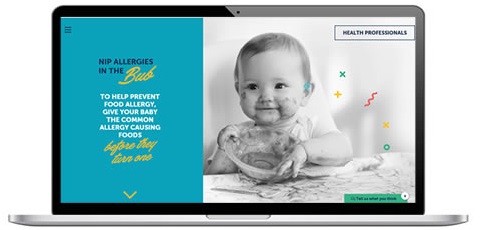 The National Allergy Strategy Food Allergy Prevention Project “Nip Allergies in the Bub” was launched today in Western Australia, where it will be piloted for a year, before it is launched throughout Australia. This project is the first in the world to promote feeding children the common allergy causing foods by one year of age, to help prevent food allergy from developing.
The National Allergy Strategy Food Allergy Prevention Project “Nip Allergies in the Bub” was launched today in Western Australia, where it will be piloted for a year, before it is launched throughout Australia. This project is the first in the world to promote feeding children the common allergy causing foods by one year of age, to help prevent food allergy from developing. Submissions for AIFA's 2018 grant round will open on January 15 and close on April 6, 2018. AIFA supports innovative early stage projects, encourages collaborative research, prioritises early career researchers (working 3-5 years after completion of their PhD) and provides opportunities to leverage further funding.
Submissions for AIFA's 2018 grant round will open on January 15 and close on April 6, 2018. AIFA supports innovative early stage projects, encourages collaborative research, prioritises early career researchers (working 3-5 years after completion of their PhD) and provides opportunities to leverage further funding.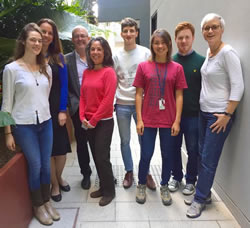 The AIFA Board is pleased to announce that a project entitled “A new approach to overcome a childhood autoinflammatory disease” led by Dr Marcia Munoz of the Garvan Institute of Medical Research has been chosen as the recipient of a $30,000 AIFA research grant. This brings the total AIFA grant figure to $130,000 in the last 4 years.
The AIFA Board is pleased to announce that a project entitled “A new approach to overcome a childhood autoinflammatory disease” led by Dr Marcia Munoz of the Garvan Institute of Medical Research has been chosen as the recipient of a $30,000 AIFA research grant. This brings the total AIFA grant figure to $130,000 in the last 4 years.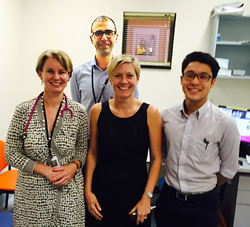 In 2015, AIFA funded a research project seeking to advance our understanding of food protein induced enterocolitis syndrome (FPIES). FPIES is an allergic disorder that occurs in approximately 1 in 10,000 children. Most affected children have their first reaction before one year of age. The main symptom of FPIES is profuse vomiting, which can be accompanied by pallor, floppiness, hypotension and hypothermia. The most common triggers for FPIES in Australia are staple foods such as cow’s milk, rice, oats, soy and eggs. Rice remains the most common cause of FPIES in Australian infants.
In 2015, AIFA funded a research project seeking to advance our understanding of food protein induced enterocolitis syndrome (FPIES). FPIES is an allergic disorder that occurs in approximately 1 in 10,000 children. Most affected children have their first reaction before one year of age. The main symptom of FPIES is profuse vomiting, which can be accompanied by pallor, floppiness, hypotension and hypothermia. The most common triggers for FPIES in Australia are staple foods such as cow’s milk, rice, oats, soy and eggs. Rice remains the most common cause of FPIES in Australian infants. 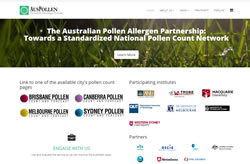 The Auspollen project was one of the first research projects funded by AIFA. Auspollen continues to expand and now invites people with hay fever (allergic rhinitis) and/or asthma that is made worse by allergens in the air, to evaluate free local AusPollen Apps.
The Auspollen project was one of the first research projects funded by AIFA. Auspollen continues to expand and now invites people with hay fever (allergic rhinitis) and/or asthma that is made worse by allergens in the air, to evaluate free local AusPollen Apps.